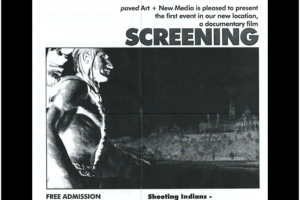
Still Indian? Shooting Indians: A Journey with Jeffrey Thomas by Ali Kazimi
20 October 2021 - 19 November 2021
Co-Production with Reel Asian and imagineNATIVE
Online programming
This fall, SAVAC presents Still Indian?, a film and conversation program produced in collaboration with Reel Asian and imagineNATIVE film festivals. The program highlights Ali Kazimi’s 1997 film Shooting Indians: A Journey with Jeffrey Thomas, originally shown by SAVAC and TRIBE Inc. in 2005 in a program titled Define Indian. Kazimi’s film came at a time when work about Indigenous and immigrant settler relations pushed the envelope in art and filmmaking on Turtle Island. 15 years on, SAVAC is excited to share this work again and revisit the conversation with our community.
Since this film’s inception, the political context of the world has shifted, both in terms of migration and indigenous sovereignty movements. We have seen how 9/11 incited a heightened vilification of people perceived to be “terrorists,” intensified border imperialism, and increased militarization both here on Turtle Island and across the Global South. In 2008, the Canadian government “apologized” for the residential school system, while the Truth and Reconciliation Commission pushed conversations and testimonies of survivors’ harm to the judicial level. Nevertheless, we are still experiencing the mass disappearance and murder of Indigenous women, and blockades are set up across the country to defend Indigenous lands from pipelines and developers alike. While discourse around migration and Indigenous sovereignty have become mainstream, we ask ourselves: does mainstreaming lead to an embodied experience of justice?
The timelessness of Kazimi’s film lies in its emphasis on the friendship between him and Jeff Thomas, who describes himself as an Urban Iroquois photographer. Friendship holds a particular space for cross-cultural dialogue and anti-colonial imagination that remains unprecedented. Through this film, Kazimi artfully demonstrates the potential of solidarity through peer-to-peer pedagogy that comes with long-lasting personal relationships. Existing outside of formalized power structures, this kind of kinship transcends political pitfalls and instead centers the emotional ties that bind people together. Shooting Indians fearlessly works outside of the frameworks of political correctness, and more towards a mutual openness and vulnerability to reach across difference.
You can learn more about the original screening and panel Define Indian, co-produced by TRIBE Inc. and SAVAC in 2005 here.
Still Indian? Panel Discussion with Ali Kazimi and Jeffrey Thomas, moderated by Métis curator Rhéanne Chartrand and Executive Director of SAVAC, Indu Vashist
Ali Kazimi is a filmmaker, author and media artist who was born and raised in India. His work deals with race, social justice, migration, history and memory. Moving to Canada in 1983, he earned his BFA in Film Production from York University. He is the recipient of the 2019 Governor General’s Award for Visual and Media Arts, and the same year he received a Doctor of Letters, honoris causa from the University of British Columbia. Ali is internationally recognized for his documentary films. His critically acclaimed works include Narmada: A Valley Rises (’94), Shooting Indians: A Journey with Jeffrey Thomas (’97), Documenting Dissent (’01), Continuous Journey (’04), Runaway Grooms (’06), Rex versus Singh (’09) and Random Acts of Legacy (’16). In 2006, Kazimi joined the Department of Film, Faculty of Fine Arts, York University as a full-time professor.
Jeff Thomas is an independent curator and photographer who deals, in examination of his own history and identity, with issues of aboriginality that have arisen at the intersections of Native and non-Native cultures in what is now Ontario and northern New York state. Nationally recognized for ground-breaking scholarship and innovative curatorial practice in this area, he has been involved in major projects at such prominent cultural institutions in Canada as the Canadian Museum of Civilization, the Woodlands Cultural Centre, the Art Gallery of Ontario, and Library and Archives Canada.
Indu Vashist has been the Executive Director of SAVAC since 2013. She is interested in art that is not precious and words that are precise.
Rhéanne Chartrand (Métis), MMSt, is the Curator of Indigenous Art at McMaster Museum of Art and a sessional lecturer with the University of Toronto, X (Ryerson) University, and McMaster University. Over the past eight years, Chartrand has curated interdisciplinary and multidisciplinary exhibitions, programs, showcases, and festivals for venues and organizations across the GTHA. Her curatorial work focuses on the praxis of survivance, Indigenous epistemes, relational aesthetics, representational politics, and gratitude.






